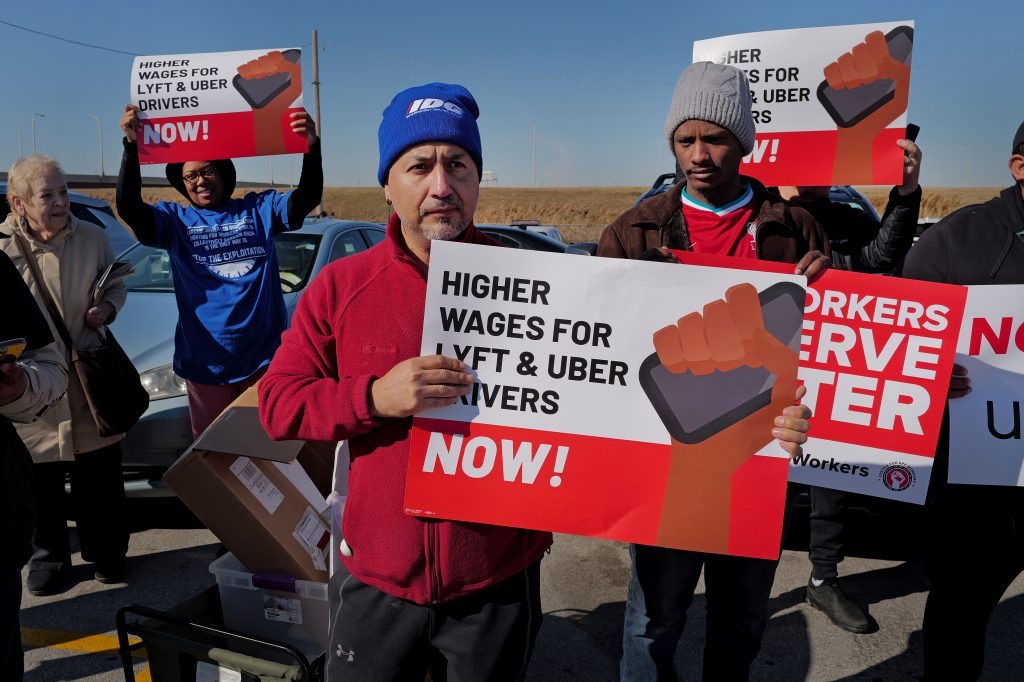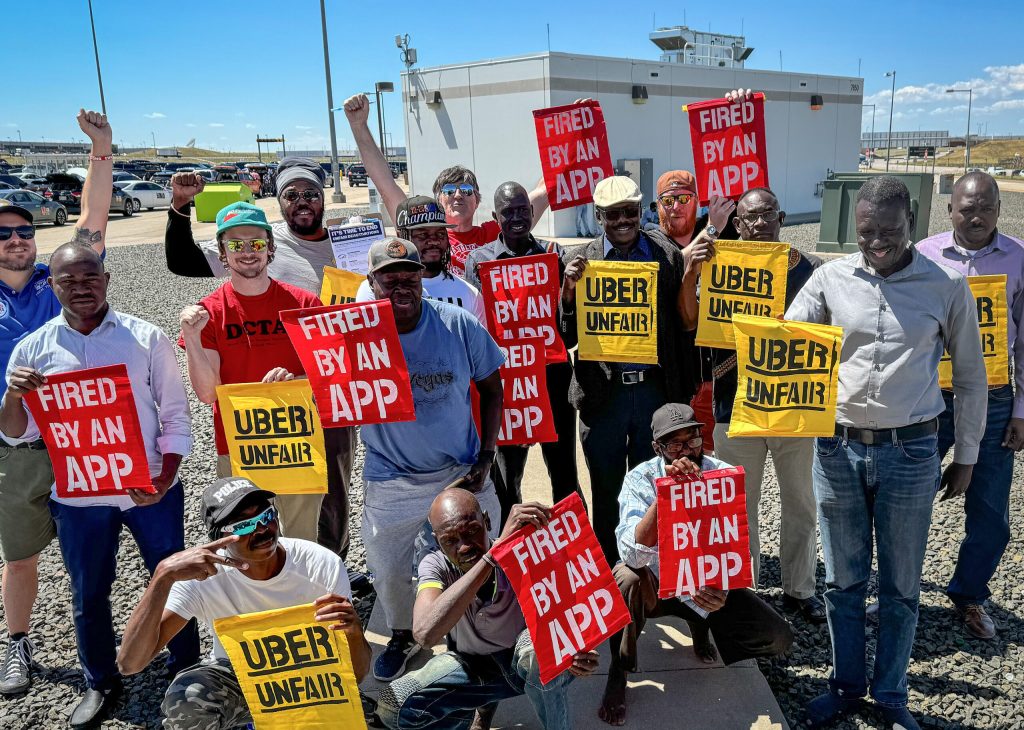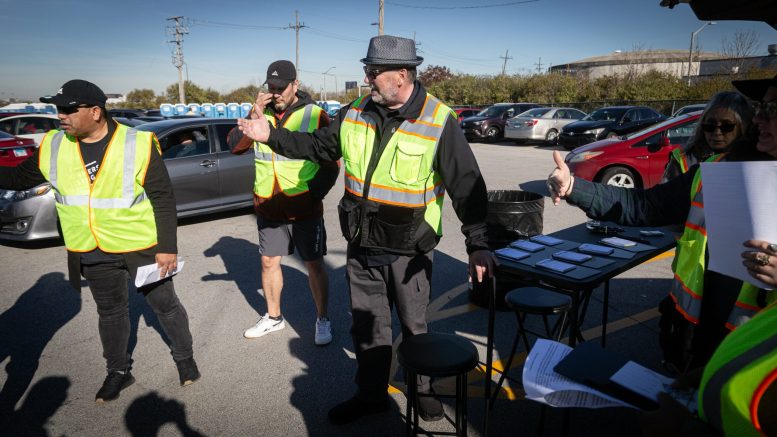From Chicago to San Jose, California, rideshare drivers are working together for higher pay, safer work and better jobs.
By Tatiana Walk-Morris
This story is produced by the award-winning journalism nonprofit Capital & Main and co-published here with permission.
On a muggy June morning, a handful of rideshare drivers descended on Chicago’s O’Hare International Airport with stacks of red, white and blue leaflets, limp in the heat, that demanded to “end unfair deactivations.” A similar scene unfolded at Denver International Airport and at Uber’s Greenlight Hub in San Jose, California. Together, drivers in three states launched Activate Respect, a national campaign against driver deactivations — what workers refer to as being “fired by an app.”
The three-city action also marked an addition to the growing national movement to make rideshare jobs good jobs. “It’s potentially very powerful for drivers to connect across cities,” said Mariah Montgomery, national campaigns director at PowerSwitch Action, an Oakland, California-based advocacy group. That connection, she said, lets workers “learn from both the wins and the losses people have experienced to apply that information in more places.”
While local campaigns have dominated efforts to improve the jobs of drivers at rideshare companies such as Lyft and Uber, Activate Respect is part of an emerging trend to coordinate driver demands in different places. Organized by PowerSwitch Action, the campaign against companies stripping drivers of access to their work accounts builds on multiple local efforts to improve rideshare jobs — some successful, some not, but all bearing sharing enough common ground that building a national effort seemed a logical step. “We can kind of see what’s happening across places and say to somebody that we’re hearing, you know, the same thing in two different places, and maybe you should talk,” Montgomery said.
The first inklings for PowerSwitch came in 2021, when the group discussed drivers’ problems with the Action Center on Race and the Economy (ACRE) and other groups. In 2023, PowerSwitch Action, ACRE and Gig Workers Rising released a national report about rideshare drivers who have died on the job. They also organized a National Day of Action to educate the public about drivers’ safety concerns. Activate Respect goes a step further, Montgomery said, by making the same, specific demand — transparency and accountability around deactivations — in different places.
Activists hope that the campaign can build on recent local successes.
In 2024, Minnesota and Colorado passed important rideshare legislation. In May, Minnesota Gov. Tim Walz, who is also the Democratic candidate for vice president, signed a bill establishing a minimum pay rate for rideshare drivers. The law followed a nearly two-year effort by the Minnesota Uber/Lyft Drivers Association that made national headlines. In June, Colorado legislators passed a law requiring companies to publicly disclose fares, driver wages, and deactivation policies after a campaign by Colorado Independent Drivers United.
In an emailed statement to Capital & Main, Uber said the Minnesota law “represents a new way officials are looking at the gig economy: a focus on benefits and protections, rather than on employment classification.”
Uber said that in Colorado, “We appreciate that Colorado Independent Drivers United was willing to make such significant compromises” but that the law will “have unintended consequences for both drivers and riders.” The company statement did not specify what those consequences might be.
In Washington state, rideshare drivers working with the Teamsters Local 117-affiliated Drivers Union won groundbreaking protections in both 2023 and 2024. In 2023, drivers successfully lobbied lawmakers for the passage of a new pay standard, paid sick leave and workers’ compensation in the state of Washington. This year, they also won death benefits under workers’ compensation coverage — which they claim as a first in the nation. Washington drivers can also now file complaints against rideshare companies and appeal deactivations, and the protections are enforced by the Washington State Department of Labor and Industries.
An Uber spokesperson expressed the company’s support for drivers maintaining their independent contractor status while receiving additional protections. The statement praised the “hard work and a commitment from all parties to stay at the negotiating table” and said the legislation could be a model for “cities, states and countries around the world.”
Uber and Lyft have fought local efforts to establish protections. In California, for example, gig workers, including rideshare drivers, collaborated with groups such as California Gig Workers Union, Gig Workers Rising, Service Employees International Union Local 721 and SEIU Local 1021 to win worker protections under AB5, a law that took effect in January 2020 and reclassified some contractors as employees — and made the companies that employed drivers responsible for their working conditions. Uber and Lyft worked with DoorDash, Instacart and Postmates to successfully cancel it out that November by pushing Proposition 22, an initiative approved by state voters that allowed the companies to continue classifying rideshare workers as independent contractors. Drivers in New York City, meanwhile, won significant protections last year, but they continue to battle new strategies that companies are using to reduce payments to drivers.
Uber said that it has invested more than $1 billion into Prop 22 benefits for California drivers and couriers as of April 2024 but offered no further comment on its stance on the law.

Over time, Montgomery said, it became clear that rideshare companies had developed a playbook for fighting worker protections — and for responding to threats of regulation. For example, Uber and Lyft have suspended operations or threatened to leave areas where regulation is likely to expand, including cities such as Austin, Texas; Chicago; and Minneapolis and states such as California and Arizona.
Cross-city organizing among rideshare drivers is difficult because they are so physically isolated from one another, said Katie Wells, a postdoctoral Fritz Fellow with Georgetown University’s new Tech & Society initiative and co-author of Disrupting D.C.: The Rise of Uber and the Fall of the City. Without a physical central hub — think the taxi garages once commonplace in big cities — rideshare drivers do not encounter each other in passing. “The fact that some folks are coming together to organize — it’s really impressive,” Wells said.
“One reason why it’s so important is because we don’t have regulators standing up to these companies, and so we have no other choice. All these groups have to come together to say that Silicon Valley isn’t going to get to have its way,” Wells said.
* * *
Chicago drivers offer a prime example of collaboration across state lines. Working with The People’s Lobby and the local chapter of the Gig Alliance, Chicago rideshare drivers have been pushing for the Chicago Rideshare Living Wage and Safety Ordinance since 2022. The proposed citywide law would raise driver pay, cap corporate profit from each passenger fare and standardize notice for deactivations, among other protections. But they are not going it alone.
Over the past few years, PowerSwitch Action had been working informally to connect rideshare drivers across multiple cities and states, said Jeff Barrera, communications director at PowerSwitch Action. But its cross-city collaboration took shape last fall, said J.C. Muhammad, a part-time rideshare driver and full-time organizer with The People’s Lobby.
That collaboration began last fall when California drivers with Gig Workers Rising flew to Chicago to meet their peers. The chilly trip was the first time Jose Gazo, a San Francisco-based driver, had visited the city, which was exciting. Before an official meeting, Gazo helped call local drivers to invite them to a meeting, highlighting that he had come out to hear what his peers were experiencing in the industry.
The cross-country group also spent several hours canvassing other drivers at O’Hare airport, asking them to write letters supporting the Chicago rideshare ordinance and to join the upcoming deactivation campaign, said Lori Simmons, gig worker organizer with the People’s Lobby in Chicago.
As the drivers spoke about their work, they realized how much they had in common — especially a drop in pay.
“All of us have different efforts going on in different cities to address pay,” said Muhammad, the Chicago driver who participated in the meeting with California drivers. Another Chicago driver who volunteers for the Chicago Gig Alliance, Joe Negrau, had been keeping a spreadsheet to track his wages from 2021 to 2023. He said he earned $2.70 per mile from Uber in 2021 before expenses — but only $1.55 per mile in 2023. A 2023 city of Chicago pay study found that nearly two-thirds (65.3%) of full-time rideshare drivers earned $31 and $40 on average per hour spent driving passengers, which dropped down to between $18.90 and $27.90 after expenses.
It was similar in California. There, a California Gig Workers Union survey of 658 Southern California drivers conducted between March and April 2022 found that 85% of respondents said rising gas prices had reduced their earnings “by a lot.” A high percentage of respondents also reported struggling to afford living expenses such as housing (82%), utilities (60%), food (59%) and medical expenses (23%).
In their conversations, the drivers realized that low pay wasn’t the only problem they shared. With a worrisome series of customer attacks on drivers, safety was also a concern. Unexpected deactivations without recourse were a problem, too.
“The next biggest thing that we needed to tackle on a national scale is deactivations,” Muhammad said.
In March, Chicago rideshare drivers flew out to San Jose to meet with the Gig Workers Alliance and Colorado Independent Drivers United to plan for the coming year, Simmons said. That month, they landed on unfair deactivations as their initial target, and the Activate Respect campaign was born.
In the months since, the cross-city meetups have continued, Simmons said.

In response to Capital & Main’s questions regarding various rideshare and gig work laws emerging across multiple states, a Lyft spokesperson said, “What we’ve seen over the past several years is a shift in the public dialog away from should drivers be employees to figuring out the best way to design protections and benefits that make sense in the context of rideshare. That’s why you’ve seen efforts to negotiate compromises in places like Washington, Minnesota and Colorado, where the companies, labor leaders, drivers and elected officials attempted to work together to find common ground.”
The Lyft spokesperson continued, “Not all these solutions have been perfect, but what they have shown is that we can begin to improve the driver experience on the platform without sacrificing the flexibility and independence that draws people to this type of work in the first place.”
When going up against such powerful rideshare companies, the cross-market collaboration helps drivers not only to feel like they are not alone, but also to build power by working together, Montgomery said.
“While the organizing might be happening in pockets, the goal is for uniformly good jobs,”Montgomery said. “Ultimately, drivers, wherever they live, deserve fair pay, respect, job security, safety at work.”
Copyright 2024 Capital & Main





Be the first to comment on "Drivers for Lyft and Uber are building a national movement"